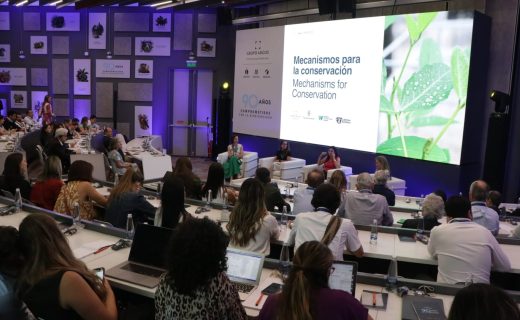

Sustainability
Grupo Argos led virtual event of Conscious Capitalism with Raj Sisodia, co-founder and global leader of this movement
6 April 2020
- Raj Sisodia presented his theory of Conscious Capitalism, a business philosophy that has as its highest purpose to improve people's lives.
- During the webinar, Sisodia shared reflections on the applications of this philosophy in the current context that companies face today.
- Conscious Capitalism is a transversal axis that Grupo Argos has incorporated in all its businesses, to transform society through investments and strategies that contribute to development and social, economic and environmental well-being.
In the midst of a challenging context in which companies reinvent themselves to ensure the continuity of their operations, privileging their actions as agents of change in society, Grupo Argos prepared a broadcast live, open to the public, a conference with Raj Sisodia, international speaker and founding member of the Conscious Capitalism movement.
During the event, the concept of Conscious Capitalism and how applying it can generate real transformations in society were reflected on. Likewise, a conversation developed around the need for adaptation that companies in the world are experiencing today as a result of Covid-19 and how Conscious Capitalism supports this transition.
“At Grupo Argos we share the philosophy of Conscious Capitalism, and in this sense, we seek to generate value for all our stakeholders. We work every day with the purpose of positively transforming the lives of millions of people through our investments in infrastructure. ”
Jorge Mario Velásquez
President of Grupo Argos
On the other hand, the international guest presented the principles of this movement, which allow companies to develop their activity in a more sustainable and comprehensive way, in which collaborators, customers, suppliers and shareholders can identify the value they generate. These principles are:
1. Higher purpose: money is not the ultimate purpose of the organization, but a means to achieve a purpose. It answers the why of the companies.
2. Conscious culture: a culture oriented towards people and collaborative values as opposed to competitive ones. Refers to how.
3. Conscious leadership: the leader serving the team and not the team serving the leader. It corresponds to who.
4. Stakeholder integration: systemic perspective of all the agents involved. Answer the what.
"Today we have a responsibility to celebrate and elevate the purpose of capitalism. For this, we must go beyond profitability, to fulfill our healing role, always seeking social welfare and understanding that the current crisis we are experiencing will only be resolved when we really alleviate the suffering of people and the environment. We will achieve this objective by being more aware and focusing our efforts to build companies in which everyone matters and everyone wins, concentrating on the internal and external impact of business, which must be established in the foundations of love and care, and not about selfishness, ”said Sisodia during the virtual event.
"We should be proud of being entrepreneurs, since we play an important role in generating positive impacts and social welfare. We hope that this conversation leaves seeds that can be applied from all fronts, to build a strong and increasingly responsible business sector with the healing role we play in society, through inspiring, purposeful and transformative leadership" concluded. Jorge Mario Velásquez to close the event.
Raj Sisodia, the international guest of this virtual event, is the co-author of the book "Conscious Capitalism: Releasing the Heroic Spirit of Business", a best seller of the New York Times and the Wall Street Journal. In addition, he is a Professor of Global Business Market Research and Whole Foods in Conscious Capitalism at Babson College in Wellesley, Massachusetts. He is also a co-founder and president emeritus of Conscious Capitalism Inc.
Mas noticias
-
 News
News -
 News
NewsGrupo Argos and the Autonomous Corporation of Atlántico (CRA) launched the book "The Memories of the Mangrove" as part of the Somos Sostenibilidad event.
12 December 2024Grupo Argos and the Autonomous Corporation of Atlántico (CRA) launched the book "The Memories of the Mangrove" as part of the Somos Sostenibilidad event.
Read more -
 Grupo Argos Foundation
Grupo Argos FoundationGrupo Argos Foundation, Terraformation, the Government of Antioquia, and the Province of Cartama sign an agreement for over COP 5 billion to promote sustainable livestock farming
6 November 2024Grupo Argos Foundation, Terraformation, the Government of Antioquia, and the Province of Cartama sign an agreement for over COP 5 billion to promote sustainable livestock farming
Read more -
 Grupo Argos Foundation
Grupo Argos FoundationGrupo Empresarial Argos will reach the record figure of one million mangrove seedlings planted in the Colombian Caribbean in the first quarter of 2025
30 October 2024Grupo Empresarial Argos will reach the record figure of one million mangrove seedlings planted in the Colombian Caribbean in the first quarter of 2025
Read more -
 Business
BusinessAndrew Winston and Paula Caballero, global sustainability leaders, presented their conclusions on nature as a lever of value for the private sector
28 October 2024Andrew Winston and Paula Caballero, global sustainability leaders, presented their conclusions on nature as a lever of value for the private sector
Read more
